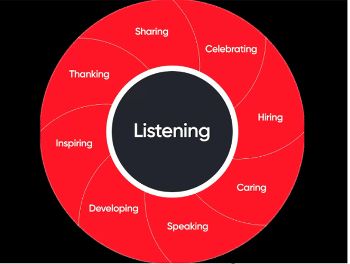9 leadership behaviors that create great places to work

Listening is the most important behavior because great listeners will develop the other critical behaviors. AzmanL via Getty Images

Connecting state and local government leaders
COMMENTARY | Creating a great place to work requires a culture of trust, and leaders who master these nine behaviors will create that culture and more successfully attract and retain talent.
As the nation continues to emerge from the pandemic, the public sector is still struggling to attract and retain talent. According to the Bureau of Labor Statistics, there were 607,000 state and local government job openings in July, but only 163,000 hires. A MissionSquare Research Institute national survey this year revealed that 59% of state and local employees are considering leaving their jobs.
To attract and retain talent in this this tough environment, public sector organizations must strive to become great places to work. UKG, where I am a senior fellow, certifies an organization as a Great Place to Work. After surveying the employees of these organizations and evaluating the more than 100 million responses, the Great Place to Work institute found that certified organizations have 50 percent less turnover than other organizations. Moreover, these places reported attracting great talent.
The key to becoming a great place to work is creating a culture where employees trust their leaders, have pride in what they do and enjoy the people they work with. The institute’s research has identified nine leadership behaviors, shown below, that will build trust and create a great place to work.

Listening
Listening is the most important behavior because great listeners will develop the other critical behaviors. Listening is not just simply hearing what someone says. Too often, we’re not really listening—we’re thinking about what we’re going to say next.
An inclusive leader considers other points of view while putting their own opinions aside. True listening requires humility, vulnerability and empathy.
Listening also takes multiple forms, including employee surveys to regularly seek employee opinions, and then following up with feedback and action.
Speaking
Speaking is about clarity, frequency, transparency and sharing information through all channels—video, intranet, email, print, person-to-person and in meetings.
It is also about who you share information with. Especially in government, leaders must reach out to front-line employees in jobs like law enforcement, firefighting, public works, parks and recreation, and public transit.
When I was human resources director at the University of Wisconsin, we put on quarterly information sessions for our second- and third-shift employees (for example, police officers, custodians, animal care technicians) who often were overlooked and underappreciated. To reach everyone, we used interpreters who communicated in Spanish, Hmong, Chinese and even Tibetan.
These “midnight sessions” were better attended than our daytime sessions. These folks were hungry for information. We convinced the university’s chancellor to speak at one session and an attendee described her appearance as “historic”—the first time many of them had ever seen the chancellor in person.
Speaking is also an opportunity to communicate how a person’s job helps the organization achieve its purpose. This is especially important in government where purpose and mission are paramount.
Thanking
If a leader is really listening, they will learn how to thank colleagues in ways that are personally meaningful and show people they’re important.
Recognizing contributions can include peer recognition, employee awards, personal notes, appreciating mistakes as learning opportunities, and recognizing employees in person and in front of others. Recognition must be sincere and meaningful. For example:
“We thank John for helping a customer through a sticky problem. At our city, we’re willing to do whatever it takes to make the customer’s problem our problem, and then solve it. I also know that John was late getting to soccer practice for his daughter. I hope he doesn't have to do that again, but we appreciate that he did that for us.”
Developing
A leader helps employees grow as people, not just as performers. This includes nurturing their talents and interests through job- and non-job-related training, educational support and personalized development plans. It includes making sure employees know about internal job opportunities (too often an underutilized strategy to meet skills shortages).
Development also means providing candid and measurable feedback. If feedback is offered with a sense of care, employees will see it as a gift and will respond. Everyone wants to improve, and public servants want to know they’re making a difference.
Caring
This is the secret weapon. Great work (and great retention) occurs when people feel they are being cared for. Now more than ever, this means employee well-being. According to a national survey conducted by the U.S. Surgeon General, 81% of employees said they will be looking for employers that support their mental health. Caring also means providing workplace flexibility and work-life balance, including helping people cope with family and personal crises.
Sharing
In the private sector, sharing often means distributing profits, bonuses and incentive pay. In government, sharing can be ensuring that raises are fair or, if compensation is merit-based, that criteria and decisions are clear and transparent.
Equitable and inclusive sharing also applies to community activities. If the organization is picking up plastic in a park, everyone should be able to participate.
Treating people equitably doesn’t mean treating everyone the same. A picnic for the day shift doesn’t also have to be a picnic for the night shift.
Celebrating
Most important is to celebrate how people help the organization achieve its purpose. Government has a unique opportunity to recognize contributions during Public Service Recognition Week, the first full week in May.
Inspiring
Local government leaders don’t have to be great public speakers—they can inspire with the questions they ask and how they listen.
Especially in government, leaders inspire by helping employees understand how their work helps the organization achieve its purpose and delivers essential services.
This can be done through customer stories, by sharing the organization’s vision and highlighting behaviors that demonstrate key values, and then reinforcing those values, stressing the organization’s contribution to the community or society, and showing how employees achieve goals.
There is a well-known anecdote from NASA. President John F. Kennedy was visiting the Space Center and asked a custodian, “What do you do here at NASA?” The custodian famously replied, “I help send men to the moon” (at that time it was only men). Apocryphal or not, this story exemplifies how employees can be inspired to support the organization’s mission.
Hiring and Welcoming
You only get one chance at a first impression, and that begins with the job application and hiring process. A local government HR director recently proudly proclaimed that the organization had reduced time-to-hire to 170 days—and this was a big reduction.
Government needs to do better, and it can do better. One municipality cut hiring time from 150 days to 45 by reengineering processes “without compromising merit principles.”
Government agencies are using social media more effectively; writing job ads that highlight the opportunity to do rewarding work (i.e., that don’t just repeat position descriptions); offering referral and hiring bonuses; and producing recruiting materials that feature how their employees are making a difference. One local government agency recruits with a compelling video entitled “Changing Lives.”
Hiring the best talent also means eliminating arbitrary minimum qualifications, such as a degree or specific years of experience unless required by law. Instead, adopt tools and techniques that truly assess whether the candidate can excel.
It is also important to welcome new hires through comprehensive onboarding, which is an integrated set of activities that begins before the new employee reports and continues throughout the new hire’s entire first year.
Creating a great place to work requires a culture of trust, and leaders who master these nine behaviors will create that culture. The result will be a greatly enhanced ability to attract, develop and retain the talent government needs to deliver for the American public.
Bob Lavigna is an award-winning public sector HR leader and innovator with more than 30 years of experience leading government organizations and programs. Currently, he is the senior fellow, public sector for UKG.

NEXT STORY: Flexible work options keeps the public sector competitive in these post-pandemic times


